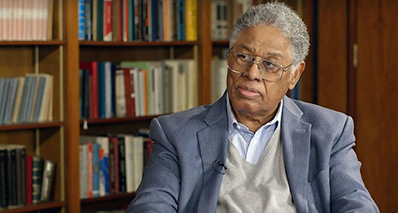The Problem of Thomas Sowell
Jef Costello, American Renaissance, October 18, 2024

Subscribe to future audio versions of AmRen articles here.
Nathan Cofnas, the Cambridge philosopher of biology who was fired from his job last April for thoughtcrime, has posted trenchant criticisms of Thomas Sowell’s views on race differences. Given the influence Dr. Sowell has had, and continues to have, these posts deserve wide attention. Dr. Cofnas published one on his blog and the other on X.
Dr. Sowell is the world’s most famous black conservative. The author of some 60 books, he is widely read both by conservatives and libertarians. Probably everyone reading this article has been influenced by his work, directly or indirectly. In only the second semester of my teaching career, I assigned Dr. Sowell’s book A Conflict of Visions to one of my classes.
The thesis of this book is that the root cause of the liberal-conservative divide is a disagreement about human nature. Liberals exhibit what Dr. Sowell calls the “unconstrained vision”: essentially, they believe that there are no inherent limits on the power of human beings to perfect themselves and the societies they live in.
Conservatives, who adhere to the “constrained vision,” think the opposite: There are inherent limits on what we can do and be. The conflict over transgender ideology is a perfect example of this difference — one that Dr. Sowell didn’t see coming (his book was published in 1987).
The basic thesis of A Conflict of Visions and the examples Dr. Sowell uses to support it are valuable, and it is a book I still recommend. Some of Dr. Sowell’s other books deal with race differences and black social pathologies, but he is sometimes less than objective on these topics.
Dr. Cofnas begins his blog post by praising Dr. Sowell, in words with which I agree:
As one of the few intelligent, non-grifter conservatives to rise to prominence, Dr. Sowell has guided hundreds of thousands if not millions of people in a better direction. He is a brilliant advocate for libertarian economics and a wise social commentor.
But Dr. Cofnas takes aim at Dr. Sowell’s highly influential version of the “cultural explanation” for racial differences in behavior and achievement: that they are due to acquired cultural traits. Dr. Sowell rejects the hereditarian theory, endorsed by Dr. Cofnas, which holds that differences are due, at least in part, to innate characteristics.
Dr. Cofnas acknowledges that Dr. Sowell, unlike most critics, deals with hereditarianism in a fairly evenhanded way, eschewing ad hominem attacks. Yet both his critique of hereditarianism and his case for environmentalism are weak.

Nathan Cofnas
Though Dr. Sowell does not endorse the “woke” thesis that black problems are due to white racism, he still ends up pinning the blame on white people. How? His version of the “cultural explanation” is that those problems are due to blacks adopting the culture of white Southern rednecks. That culture, in Dr. Cofnas’s words:
included an aversion to work, proneness to violence, neglect of education, sexual promiscuity, improvidence, drunkenness, lack of entrepreneurship, reckless searches for excitement, lively music and dance, and a style of religious oratory marked by strident rhetoric, unbridled emotions, and flamboyant imagery.
Dr. Sowell’s proof for this thesis seems to consist mainly in an attempted disproof of the claim that genetics could have anything to do with black — or white — shortcomings. For example, he notes that on the Army Alpha test given to recruits during the First World War, blacks from four Northern states averaged higher scores than whites from four Southern states.
Dr. Sowell argues that this was because Northern blacks had absorbed the culture of Northern whites, whereas the lower-scoring Southern whites were dragged down by “redneck culture.” However, while Pennsylvania blacks outscored Mississippi whites, those same blacks did not score at the same level as Pennsylvania whites.
Dr. Cofnas cites Arthur Jensen, who noted that within each state the black-white gap is roughly comparable to the black-white gap in the nation as a whole. Thus, within each state, blacks score significantly lower than whites, even if they may score higher than whites in some other states. (Dr. Sowell also cites Jensen but, as Dr. Cofnas shows, he misunderstands him.)
Dr. Cofnas offers “selective migration” as a plausible hereditarian explanation for why Northern blacks might score higher than some Southern whites: The most intelligent blacks went North for a better life. Many were mulattos.
Dr. Sowell, as Dr. Cofnas points out, seems to believe in “racial genetic homogeneity.” Differences in average intelligence of groups of blacks and whites in different geographic areas does not mean that only environmental factors explain these differences. Subgroups within races are not genetically identical. There are no such things as “generic” black and white people.
As an aside, I will mention a further problem with Dr. Sowell’s theory. As a Southerner, I don’t recognize the “rednecks” in Dr. Sowell’s explanation. I don’t see much “aversion to work” and “improvidence” in the whites around me whom Southerners might call rednecks.
In the aftermath of Hurricane Helene, rednecks immediately went to work sawing fallen trees, helping neighbors clear debris, and sharing food. Southern blacks looted stores, robbed homes, and cursed our governor for not instantly restoring water and electricity.

Residents and volunteers clean up on Oct. 1, 2024, after the French Broad River flooded downtown Marshall, North Carolina. (Credit Image: © Travis Long/The News & Observer via ZUMA Press Wire)
It seems to me that Dr. Sowell, who was raised in New York City, is describing what we Southerners call “poor white trash” and not rednecks. Of course, this is a terminological objection; Dr. Sowell could just as easily say blacks got their dysfunctional culture from poor white trash.
And it is the case that blacks and white trash — and not just in the South — do have a great deal in common. However, this leads to a problem for Dr. Sowell: who influenced whom? It’s plausible that poor white trash have been influenced by blacks. I am not endorsing cultural explanations; poor white trash do have lower IQs than more successful whites — and lower IQs than some blacks.
But it is both heredity and environment that make individuals and groups what they are. White trash have a long history of aping blacks. We see this today in low-class whites who dress like gangbangers and imitate black speech patterns and mannerisms.
Dr. Sowell is sometimes shockingly unable to see heredity at work. Dr. Cofnas quotes from Dr. Sowell’s Black Rednecks and White Liberals (2005):
Among nineteenth-century Negroes in Philadelphia, . . . there were major behavioral differences between [mulattos and blacks]. The mulatto neighborhoods had lower crime rates and a higher percentage of their children attending school, as compared to the black neighborhoods, even though it can hardly be claimed that school attendance or crime rates are genetically predetermined.
Dr. Sowell is right: school attendance and criminality are probably not directly determined by genes, but they are influenced by traits that are: intelligence and conscientiousness.
How can Dr. Sowell not see how heredity is the obvious explanation for the social differences between mulattos and blacks? The lines above are followed by:
All across the country, North and South, the elite of the Negro community were lighter in complexion than the masses — and very self-conscious, and sometimes snobbish, about that fact.
A hereditarian would argue that mulattos were more successful because their parents had interbred with whites, but Dr. Sowell insists on nebulous “cultural” explanations for group differences. For example, he cites the fact that blacks who immigrated from the West Indies tended to do much better than native-born blacks. West Indian blacks in New York at one point had an average income 28 percent higher than native blacks, and in the early 1970s, all black federal judges in New York were of West Indian ancestry.
Dr. Sowell draws a non sequitur conclusion: “Neither race nor racism can explain such differences.” He attributes the success of West Indians to a culture superior to that of redneck-influenced American blacks. Dr. Cofnas asks the crucial question:
If West Indian black culture produces such good results in New York, why doesn’t the culture work its magic in the West Indies? Countries like Jamaica and Grenada continue to exhibit results that are consistent with lower average IQ.
The hereditarian explanation for the success of Caribbean blacks is, once again, selective migration. In all likelihood, it was the more intelligent black West Indians who emigrated. Again, Dr. Sowell does not recognize genetic variation within populations.
Dr. Cofnas’s most devastating objection to Dr. Sowell is to point out that his cultural explanation of racial differences applies only to descendants of black slaves in the US. Throughout the world, blacks exhibit exactly the same characteristics Dr. Sowell claims that American blacks picked up from Southern white rednecks.
Dr. Cofnas notes that Dr. Sowell does not even look at recent psychometric data and instead cites problematic studies from the 1920s and ’30s. Dr. Sowell makes much of the fact that black children adopted by white parents tend to score higher on IQ tests than other blacks, but he seems not to know that these higher scores disappear as the children enter early adulthood and as IQ become more heritable. Adopted blacks end up scoring just like other blacks.
Dr. Cofnas also critiques Dr. Sowell’s account of the alleged miracle of Dunbar High School. Dunbar was an all-black school founded in 1870 in Washington, DC that supposedly achieved amazing results with what Dr. Cofnas calls “the pull-your-pants-up-and-show-some-respect strategy favored by mainstream conservatives.” In Black Rednecks and White Liberals, Dr. Sowell claims that students were not selected with IQ tests, but by the time they made it through Dunbar, the average IQ was as high as 111.
Dr. Cofnas comments:
Anyone familiar with intelligence research knows that such results are unprecedented. If what Dr. Sowell reports is even 50% true, it would radically alter our understanding of intelligence, heritability, race, and society.
The trouble is that no one can find any evidence to support Dr. Sowell’s claim. When he discusses Dunbar again in Intellectuals and Race (2013), he drops the claim about black IQ.
Dr. Cofnas treats Dr. Sowell with great respect, but argues that that one reason he has managed to skate by for so long with these bad arguments is that he has not been held to as high a standard as his white colleagues. White conservatives have always been so pleased to have a black academic on their side, they have tended to do nothing but praise Dr. Sowell. Liberal critics have mostly left him alone — because he is black and opposes hereditarianism. This has not been fair to Dr. Sowell. He is obviously a highly intelligent man who would have benefitted from fair-minded but tough criticism.

Jane Freeman, Bill Buckley and winner of the 2003 Bradley Prize, Thomas Sowell (Credit Image: The Washington Times/ZUMAPRESS.com)
One final criticism: Dr. Sowell does not seem to recognize that his apparent belief in the infinite malleability of people by “culture” belongs more to the “unconstrained vision” of liberalism than to the “constrained vision” of conservatism that he champions. His weak arguments about racial differences must stem partly from wishful thinking.
I remember years ago discussing Dr. Sowell with a friend who agreed that Dr. Sowell must be a very smart black man. After a long pause, he added, “He’s got to be very lonely.” If I were a black of Dr. Sowell’s intellectual caliber, I might find the truth about racial differences and heredity hard to accept. For that reason, I cannot judge him too harshly. And I will continue to read him, but with a critical eye.















